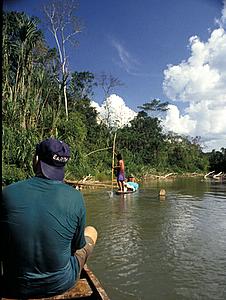 Mistake, mistake, mistake – How could I have made such a stupid
mistake. At our late lunch stop I had changed from boots to
sandals, strong sandals, the problem was not with the footwear but
with my brain which seemed to have gone into non thinking mode as
the day started to turn to twilight. We had been walking fast,
through thick rain forest and crossing and re-crossing rivers or
maybe even the same river. The last few Kilometres of the twenty
seven from our jump into the jungle to the 'Yawanawa'
village, our guides had decided to make what was a two day trek
into one. Why? I have no idea, unless it was too see how we would
make out. My legs felt like lead pillars as I walked in the river
my sandals acting like buckets holding my down feet, like walking
in treacle, my heart pounded loudly with each stride as I tried to
keep up with 'Yawanawa' Indian ahead, who was starting to
disappear in the dusk. The tribe had warned us that the rain forest
was very dangerous at night and they would always be back in the
village by nightfall! Just as I thought I could go no further and
dusk started to turn to darkness, I saw a figure on the shore about
a hundred metres away waving me on. I staggered up to Adam Baines,
for that's who it was, as he said “Well done Tony we have
made it” and we shook hands. Months of politicking in the
urban jungle, then many adventures on the way to our final
destination, the 'Yawanawa' village of Novo Esperanca – At
last we had arrived or nearly, the last hurdle or just about the
last straw, was about seventy steps cut in to the steep river bank
leading up to the village.
Mistake, mistake, mistake – How could I have made such a stupid
mistake. At our late lunch stop I had changed from boots to
sandals, strong sandals, the problem was not with the footwear but
with my brain which seemed to have gone into non thinking mode as
the day started to turn to twilight. We had been walking fast,
through thick rain forest and crossing and re-crossing rivers or
maybe even the same river. The last few Kilometres of the twenty
seven from our jump into the jungle to the 'Yawanawa'
village, our guides had decided to make what was a two day trek
into one. Why? I have no idea, unless it was too see how we would
make out. My legs felt like lead pillars as I walked in the river
my sandals acting like buckets holding my down feet, like walking
in treacle, my heart pounded loudly with each stride as I tried to
keep up with 'Yawanawa' Indian ahead, who was starting to
disappear in the dusk. The tribe had warned us that the rain forest
was very dangerous at night and they would always be back in the
village by nightfall! Just as I thought I could go no further and
dusk started to turn to darkness, I saw a figure on the shore about
a hundred metres away waving me on. I staggered up to Adam Baines,
for that's who it was, as he said “Well done Tony we have
made it” and we shook hands. Months of politicking in the
urban jungle, then many adventures on the way to our final
destination, the 'Yawanawa' village of Novo Esperanca – At
last we had arrived or nearly, the last hurdle or just about the
last straw, was about seventy steps cut in to the steep river bank
leading up to the village.
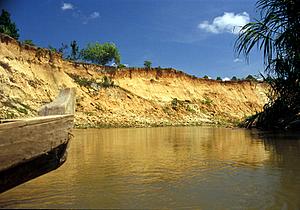 The 'Yawanawa' were early risers, the queue for the
bathroom or in this case the river started at 0415 hours for the
women and then the men from about 0445 hours. Breakfast consisted
of something from the day before, usually highly salted and
difficult to keep down as the sun started to kiss the village roofs
of the 'Yawanawa'.
The 'Yawanawa' were early risers, the queue for the
bathroom or in this case the river started at 0415 hours for the
women and then the men from about 0445 hours. Breakfast consisted
of something from the day before, usually highly salted and
difficult to keep down as the sun started to kiss the village roofs
of the 'Yawanawa'.
Adam and I stayed in the village main
hut, a sort of Pub with no beer or village hall, were the tribe met
either to eat with the chief or discus tribal policies or problems.
This hut had one large interior room with a double bed and a
hammock, I had the hammock after a discussion that I'm not sure
if I won or lost!? There was also a kitchen, or should I say a
small room that contained a medium size gas bottled refrigerator,
used if any medicine had been air dropped to the tribe and needed
to be kept cold and a large jug of water with a tin bowl.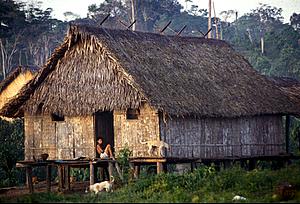 We had a
special treat one night, when the chief switched the fridge on for
a couple of hours and we had a mug of cold water that tasted as
good as any cold beer I have ever tasted.
We had a
special treat one night, when the chief switched the fridge on for
a couple of hours and we had a mug of cold water that tasted as
good as any cold beer I have ever tasted.
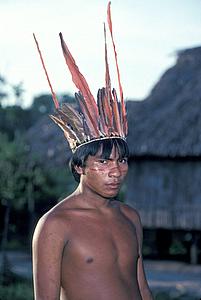 These Indigenous people had five different ways of sustaining
themselves,' in the depth of this green paradise.
These Indigenous people had five different ways of sustaining
themselves,' in the depth of this green paradise.
The hunters split the area around the village into seven parts and
one part was never hunted on for seven years. They hunted and ate,
monkeys, deer, wild pig, various birds and some things I did not
want to know the name of. Fruit and fish were also part of their
main diet. These people were just about to experiment with having
one field for various vegetables.
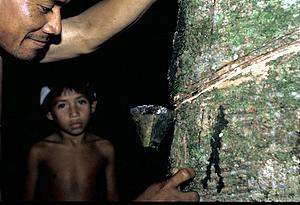 The two ways they made some money was with 'Aveda', a
Canadian firm that bought Uruku off the 'Yawanawa' for the
making of their expensive and famous make up, sold in top shops
like 'Harvey Nichols' both here, France and in North
America. The second way was with tapping the rubber and making it
into a sort of vegetable leather used in bags of all types and also
sold in quality shops in the worlds fashionable capitols.
The two ways they made some money was with 'Aveda', a
Canadian firm that bought Uruku off the 'Yawanawa' for the
making of their expensive and famous make up, sold in top shops
like 'Harvey Nichols' both here, France and in North
America. The second way was with tapping the rubber and making it
into a sort of vegetable leather used in bags of all types and also
sold in quality shops in the worlds fashionable capitols.
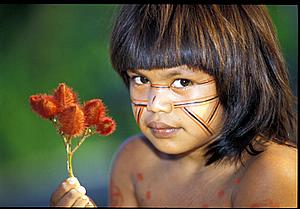 The children had half a day of school and half a day of learning
how to work like their parents, in whatever was their speciality.
The best hunters or fisherman got the best and most desirable woman
as wives. I asked why no one seemed to wear glasses or have bad
hearing? – The answer was simple nobody would marry anyone with
those problems and therefore they were bred out – Survival of the
fittest! Adam's words echoed round my brain, “Lucky you
were born in London Tony”.
The children had half a day of school and half a day of learning
how to work like their parents, in whatever was their speciality.
The best hunters or fisherman got the best and most desirable woman
as wives. I asked why no one seemed to wear glasses or have bad
hearing? – The answer was simple nobody would marry anyone with
those problems and therefore they were bred out – Survival of the
fittest! Adam's words echoed round my brain, “Lucky you
were born in London Tony”.
 The money the village made enabled them to have huts made out of
planks but in the same traditional design but better fitting than
the log version.
The money the village made enabled them to have huts made out of
planks but in the same traditional design but better fitting than
the log version.
The tribe lived by some simple rules of the live and let live sort.
Laziness was a major sin because it let down a people that had to
pull together to survive. Daime was taken once every six weeks, the
drug that keeps your head in order, or tidies the files of your
mind. The last execution had been fifty years ago and everyone in
the tribe had to watch over the age of twelve. The idea being, that
when the 'Yawanawa' voted the death sentence, the tribe
would know the horror of execution and think carefully before
voting for death.
These people gathered on the large veranda of the main house in the
evening to eat with the chief, play cards on the only table in the
village, with a solitary candle lighting the game. Saturday night
would be dance night and they would dance until dawn of the next
day. A ghetto blaster run by a car battery, (that had been charged
by a solar panel), in one of the huts again lit by one candle,
would explode sound into the night frightening off any sort of
animal, reptile or even insect far away from the village.
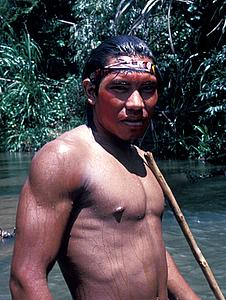 Antonio looked after the canoes and water transport; the tribe
would have its own specialists just as we do in our world. The
Chief himself would deal with the outside world business. The
Marriage with outsiders was not encouraged, The 'Yawanawa'
did not want Aids to in filter the village and also when a non
Indian married one of their girls, they tended to take the bride
out of the tribal area to live.
Antonio looked after the canoes and water transport; the tribe
would have its own specialists just as we do in our world. The
Chief himself would deal with the outside world business. The
Marriage with outsiders was not encouraged, The 'Yawanawa'
did not want Aids to in filter the village and also when a non
Indian married one of their girls, they tended to take the bride
out of the tribal area to live.
As the time came to leave this green paradise, I thought had it
been worth all the problems in the urban jungle, difficulties of
permissions, of hopes being raised and dashed and then raised
again. The answer of course was a big yes. Staying with
'Yawanawa' even though for a short time taught me so much
not just about the tribe but about myself as well. Everything is
possible, with determination, tenacity, time and a belief in
yourself, even when others say that your idea is impossibility.

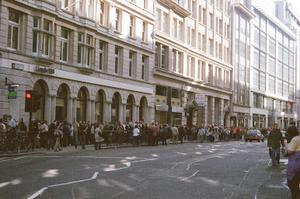 So, instead, we went to the Bank of England and we
joined a guided tour there. It was excellent! Believe it or not,
the site of the Bank of England, which has been located in
Threadneedle Street since 1734, covers a massive 3 ½ acres – who
would have thought it! We moved down a very majestic staircase
to some beautiful state rooms downstairs and through the
gardens and up again to the rooms that are used to hold meetings
with visiting officials to discuss monetary policy. The tour ended
in the Bank's museum which is fascinating and includes a gold
bullion bar, encased in bullet proof glass, of course, which
Padmassana had a go at lifting through the specially designed hole
for people to touch the bar. You can visit the museum any time and
it is free of charge. The museum is open Monday to Friday, 10.00 –
17.00, Christmas Eve, 10.00 – 13.00 but is closed at weekends and
on Public and Bank Holidays.
So, instead, we went to the Bank of England and we
joined a guided tour there. It was excellent! Believe it or not,
the site of the Bank of England, which has been located in
Threadneedle Street since 1734, covers a massive 3 ½ acres – who
would have thought it! We moved down a very majestic staircase
to some beautiful state rooms downstairs and through the
gardens and up again to the rooms that are used to hold meetings
with visiting officials to discuss monetary policy. The tour ended
in the Bank's museum which is fascinating and includes a gold
bullion bar, encased in bullet proof glass, of course, which
Padmassana had a go at lifting through the specially designed hole
for people to touch the bar. You can visit the museum any time and
it is free of charge. The museum is open Monday to Friday, 10.00 –
17.00, Christmas Eve, 10.00 – 13.00 but is closed at weekends and
on Public and Bank Holidays.
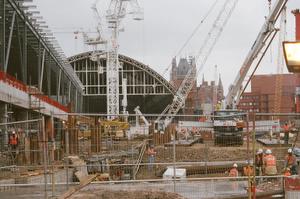 After the Bank of England tour, we visited one of the
livery companies near Smithfield market and after a fry up at the
Beetle's favourite 24/7 greasy spoon café, we headed up to St
Pancras and joined a tour run by Arups, the consulting engineers
responsible for building the new ST Pancras train staton which is
to be the new home of the Eurostar as well as a new and upgraded
train station for regional trains.
After the Bank of England tour, we visited one of the
livery companies near Smithfield market and after a fry up at the
Beetle's favourite 24/7 greasy spoon café, we headed up to St
Pancras and joined a tour run by Arups, the consulting engineers
responsible for building the new ST Pancras train staton which is
to be the new home of the Eurostar as well as a new and upgraded
train station for regional trains.




 Mistake, mistake, mistake – How could I have made such a stupid
mistake. At our late lunch stop I had changed from boots to
sandals, strong sandals, the problem was not with the footwear but
with my brain which seemed to have gone into non thinking mode as
the day started to turn to twilight. We had been walking fast,
through thick rain forest and crossing and re-crossing rivers or
maybe even the same river. The last few Kilometres of the twenty
seven from our jump into the jungle to the 'Yawanawa'
village, our guides had decided to make what was a two day trek
into one. Why? I have no idea, unless it was too see how we would
make out. My legs felt like lead pillars as I walked in the river
my sandals acting like buckets holding my down feet, like walking
in treacle, my heart pounded loudly with each stride as I tried to
keep up with 'Yawanawa' Indian ahead, who was starting to
disappear in the dusk. The tribe had warned us that the rain forest
was very dangerous at night and they would always be back in the
village by nightfall! Just as I thought I could go no further and
dusk started to turn to darkness, I saw a figure on the shore about
a hundred metres away waving me on. I staggered up to Adam Baines,
for that's who it was, as he said “Well done Tony we have
made it” and we shook hands. Months of politicking in the
urban jungle, then many adventures on the way to our final
destination, the 'Yawanawa' village of Novo Esperanca – At
last we had arrived or nearly, the last hurdle or just about the
last straw, was about seventy steps cut in to the steep river bank
leading up to the village.
Mistake, mistake, mistake – How could I have made such a stupid
mistake. At our late lunch stop I had changed from boots to
sandals, strong sandals, the problem was not with the footwear but
with my brain which seemed to have gone into non thinking mode as
the day started to turn to twilight. We had been walking fast,
through thick rain forest and crossing and re-crossing rivers or
maybe even the same river. The last few Kilometres of the twenty
seven from our jump into the jungle to the 'Yawanawa'
village, our guides had decided to make what was a two day trek
into one. Why? I have no idea, unless it was too see how we would
make out. My legs felt like lead pillars as I walked in the river
my sandals acting like buckets holding my down feet, like walking
in treacle, my heart pounded loudly with each stride as I tried to
keep up with 'Yawanawa' Indian ahead, who was starting to
disappear in the dusk. The tribe had warned us that the rain forest
was very dangerous at night and they would always be back in the
village by nightfall! Just as I thought I could go no further and
dusk started to turn to darkness, I saw a figure on the shore about
a hundred metres away waving me on. I staggered up to Adam Baines,
for that's who it was, as he said “Well done Tony we have
made it” and we shook hands. Months of politicking in the
urban jungle, then many adventures on the way to our final
destination, the 'Yawanawa' village of Novo Esperanca – At
last we had arrived or nearly, the last hurdle or just about the
last straw, was about seventy steps cut in to the steep river bank
leading up to the village.
 The 'Yawanawa' were early risers, the queue for the
bathroom or in this case the river started at 0415 hours for the
women and then the men from about 0445 hours. Breakfast consisted
of something from the day before, usually highly salted and
difficult to keep down as the sun started to kiss the village roofs
of the 'Yawanawa'.
The 'Yawanawa' were early risers, the queue for the
bathroom or in this case the river started at 0415 hours for the
women and then the men from about 0445 hours. Breakfast consisted
of something from the day before, usually highly salted and
difficult to keep down as the sun started to kiss the village roofs
of the 'Yawanawa'. We had a
special treat one night, when the chief switched the fridge on for
a couple of hours and we had a mug of cold water that tasted as
good as any cold beer I have ever tasted.
We had a
special treat one night, when the chief switched the fridge on for
a couple of hours and we had a mug of cold water that tasted as
good as any cold beer I have ever tasted.
 These Indigenous people had five different ways of sustaining
themselves,' in the depth of this green paradise.
These Indigenous people had five different ways of sustaining
themselves,' in the depth of this green paradise.
 The two ways they made some money was with 'Aveda', a
Canadian firm that bought Uruku off the 'Yawanawa' for the
making of their expensive and famous make up, sold in top shops
like 'Harvey Nichols' both here, France and in North
America. The second way was with tapping the rubber and making it
into a sort of vegetable leather used in bags of all types and also
sold in quality shops in the worlds fashionable capitols.
The two ways they made some money was with 'Aveda', a
Canadian firm that bought Uruku off the 'Yawanawa' for the
making of their expensive and famous make up, sold in top shops
like 'Harvey Nichols' both here, France and in North
America. The second way was with tapping the rubber and making it
into a sort of vegetable leather used in bags of all types and also
sold in quality shops in the worlds fashionable capitols.
 The children had half a day of school and half a day of learning
how to work like their parents, in whatever was their speciality.
The best hunters or fisherman got the best and most desirable woman
as wives. I asked why no one seemed to wear glasses or have bad
hearing? – The answer was simple nobody would marry anyone with
those problems and therefore they were bred out – Survival of the
fittest! Adam's words echoed round my brain, “Lucky you
were born in London Tony”.
The children had half a day of school and half a day of learning
how to work like their parents, in whatever was their speciality.
The best hunters or fisherman got the best and most desirable woman
as wives. I asked why no one seemed to wear glasses or have bad
hearing? – The answer was simple nobody would marry anyone with
those problems and therefore they were bred out – Survival of the
fittest! Adam's words echoed round my brain, “Lucky you
were born in London Tony”.
 Antonio looked after the canoes and water transport; the tribe
would have its own specialists just as we do in our world. The
Chief himself would deal with the outside world business. The
Marriage with outsiders was not encouraged, The 'Yawanawa'
did not want Aids to in filter the village and also when a non
Indian married one of their girls, they tended to take the bride
out of the tribal area to live.
Antonio looked after the canoes and water transport; the tribe
would have its own specialists just as we do in our world. The
Chief himself would deal with the outside world business. The
Marriage with outsiders was not encouraged, The 'Yawanawa'
did not want Aids to in filter the village and also when a non
Indian married one of their girls, they tended to take the bride
out of the tribal area to live.
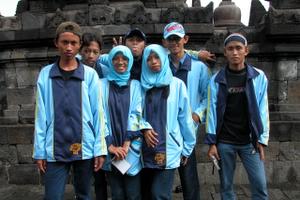
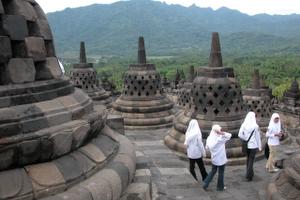
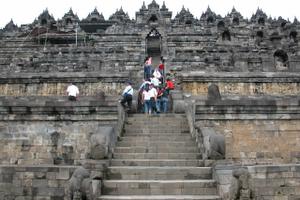 Early morning is the best time to visit Javanese temples, Borobudur
included. The gate opens at 6 am, around sunrise. The view of the
surrounding volcanoes and the Bukit Menoreh range to the south is
clearest at dawn, although morning mists sometimes obscure the view
until 8 am. Visitors must walk 500 meters to the base of the hill
then climb a series of steps to reach the temple foot. To see all
the reliefs one must walk more than 2 km (1.25 mile) around the four
galleries and climb several flights of steps. The minimum amount of
time needed at the Site is 1.5 hours.
Early morning is the best time to visit Javanese temples, Borobudur
included. The gate opens at 6 am, around sunrise. The view of the
surrounding volcanoes and the Bukit Menoreh range to the south is
clearest at dawn, although morning mists sometimes obscure the view
until 8 am. Visitors must walk 500 meters to the base of the hill
then climb a series of steps to reach the temple foot. To see all
the reliefs one must walk more than 2 km (1.25 mile) around the four
galleries and climb several flights of steps. The minimum amount of
time needed at the Site is 1.5 hours.